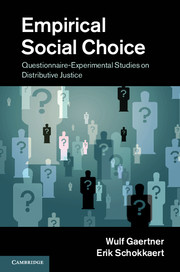1 - Introduction
Published online by Cambridge University Press: 05 January 2012
Summary
In his Nicomachean Ethics, Aristotle wrote that ‘both the unjust man and the unjust act are unfair or unequal, and clearly in each case of inequality there is something intermediate, viz., that which is equal . . . Then if what is unjust is unequal, what is just is equal.’ Justice is here defined as equality. However, Aristotle continued, saying that ‘a just act necessarily involves at least four terms: two persons for whom it is in fact just, and two shares in which its justice is exhibited. And there will be the same equality between the shares as between the persons, because the shares will be in the same ratio to one another as the persons; for if the persons are not equal, they will not have equal shares; and it is when equals have or are assigned unequal shares, or people who are not equal, equal shares, that quarrels and complaints break out’ (fourth century bc, 1976, pp. 177–8). Therefore, Aristotle viewed ‘equality’ as a kind of proportion. ‘What is just . . . is what is proportional, and what is unjust is what violates the proportion. So one share becomes too large and the other too small. This is exactly what happens in practice: the man who acts unjustly gets too much and the victim of injustice too little of what is good’ (1976, p. 179).
Since Aristotle, many different theories of distributive justice have been proposed, by philosophers as well as by social scientists. Moreover, the content of justice is an essential ingredient of the political debate in many countries. Ideas of proportionality and equality have kept playing an important role in these discussions. However, both ideas remain empty as long as one does not define explicitly what the variables are that have to be in proportion or what it is that has to be distributed equally. The real debate is then about the following questions that we consider as basic. Should a just income distribution correct for differences in needs and, if yes, how? Should one take into account differences in tastes, or in the capacity to enjoy various goods, as proposed by utilitarianism? Should differences in productivity be rewarded? Should we distinguish between productivity differences reflecting differences in natural talent and those reflecting effort? More generally, how should aspects of responsibility and desert be integrated? And what about historical or legal claims?
- Type
- Chapter
- Information
- Empirical Social ChoiceQuestionnaire-Experimental Studies on Distributive Justice, pp. 1 - 4Publisher: Cambridge University PressPrint publication year: 2011



